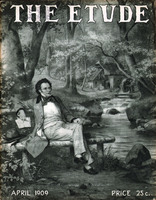Richard Strauss has again become the most sensational figure in the musical world. The European performances of his newest opera, “Elektra,” and the American performances of “Salome” have made columns of copy for newspapers everywhere. If the main incidents upon which the plots of these plays were founded were to occur to-day they would find public notice only in those “yellow” journals which confine themselves to news that is “not fit to print.” Loathsome and morbid in the extreme, these pieces have attracted far more by reason of their sensational librettos than by their music.
Remarkable as Strauss’ music undoubtedly is, it must be admitted that its educational influence is limited to the large cities. His principal works require the machinery of the theatre and the employment of huge orchestras. Even the advanced musicians will find the pianoforte study of most of his scores tedious and aggravating. Without the orchestra and the picture beyond the proscenium they have little value.
In the case of the opera this is perhaps not undesirable. When Oscar Wilde, the most meretricious genius of the past century, wrote “Salome” he selected the most ghastly story in biblical history. In print the story itself is extremely revolting, but with the realism of the theatre it becomes sickening and horrifying. At best it is an orgy of blood and lust. The story of “Elektra” is equally monstrous. Certainly these operas do not contribute to the beauty, progress or happiness of the world. They are particularly out of tune with the best in our American life. They have comparatively no musical educational influence and their only object can be to pander to the curious, sensation-loving public and their only result to fatten the pockets of their producers.



